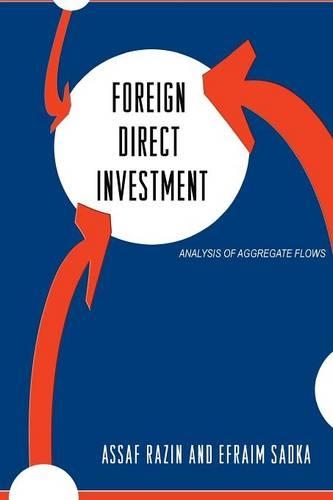
Foreign Direct Investment: Analysis of Aggregate Flows
(Paperback)
Available Formats
Publishing Details
Foreign Direct Investment: Analysis of Aggregate Flows
By (Author) Assaf Razin
By (author) Efraim Sadka
Princeton University Press
Princeton University Press
6th September 2016
United States
Classifications
Professional and Scholarly
Non Fiction
Investment and securities
Political science and theory
332.673
Physical Properties
Paperback
160
Width 152mm, Height 235mm
255g
Description
The 1990s saw global flows of foreign direct investment increase some sevenfold, spurring economists to explore FDI from a micro- or trade-based perspective. Foreign Direct Investment is one of the first books to analyze the macroeconomics of FDI, treating FDI as a unique form of international capital flow between specific pairs of countries. By ex
Reviews
"Razin and Sadka provide a modern treatment of aggregate foreign direct investment flows and their relationship to portfolio investment and taxation. A unique perspective of this treatise is the emphasis on the role of threshold effects that emerge from fixed costs of FDI. Importantly, there is theory and evidence, which combine into an integrated view of the subject. Scholars and students of international economics will greatly benefit from reading this book."Elhanan Helpman, Harvard University
"Foreign direct investment flows have become a major feature of the world economy. This book provides a fascinating, novel approach to explaining the determinants of these cross-border investment flows. Razin and Sadka skillfully intertwine theory and empirics to shed new light on the role of private information and fixed costs of operation in shaping foreign direct investment flows. I highly recommend this book for anyone interested in international economics."Pol Antrs, Harvard University
"This book is an important and timely contribution to our understanding of foreign direct investment. The book contains a great deal of useful material. It begins by presenting a suite of new models for thinking about FDI. This is followed by a review of a range of new data on FDI, combined with empirical techniques that help clarify patterns present in FDI in developing countries. Finally, the book studies one policy issue in depth: the tendency of tax competition among countries to lead to inefficiently low taxes. Interestingly, the book provides a new spin on this argument, showing that host-country taxes need not become too low."Mark Wright, Stanford University
Author Bio
Assaf Razin and Efraim Sadka are the authors of Labor, Capital, and Finance. Razin is the Bernard L. Schwartz Chair for the Study of Global Competitive Markets at Tel Aviv University, the Friedman Professor of International Economics at Cornell University, and a research fellow at the NBER, CEPR, and CESifo. Sadka is the Henry Kaufman Professor of International Capital Markets at Tel Aviv University and a research fellow at CESifo and IZA.
